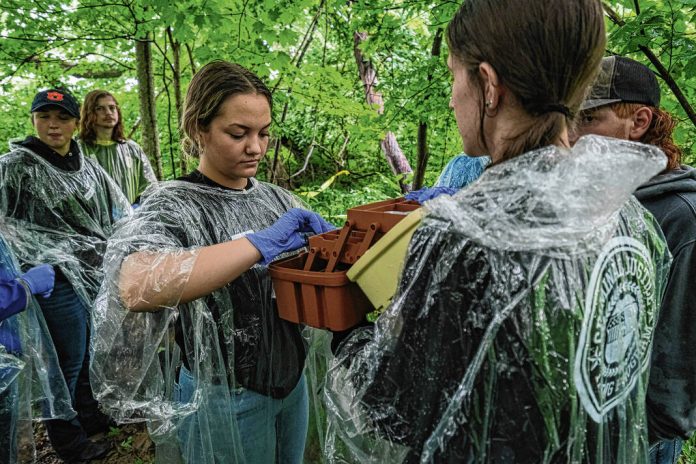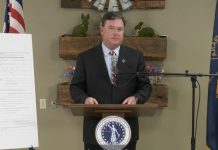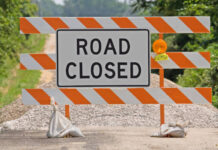
Mike Wolanin | The Republic C4 criminal justice students Kendall Combest, left, and Savanna Davis prepare to collect evidence from a mock crime scene in Clifty Park during the C4 criminal justice program’s Forensic Field Day in Columbus, Ind., Tuesday, May 16, 2023.
Editor’s note: The following story contains details and descriptions that may be upsetting to some readers.
High school students recently found themselves on the hunt for answers about some piggies that never came home.
C4 held its annual “Forensic Field Day” on Tuesday, with criminal justice and biomedical students investigating mock crime scenes in the morning and conducting autopsies on the “victims” — which were actually fetal pigs — in the afternoon, with guidance from a variety of law enforcement, health care and government officials.
“I think we are the only CTE program doing something like this,” said Charles “Mike” Ward, a criminal justice instructor at C4.
The Forensic Field Day partnership was recently recognized at the annual Career and Technical Education Awards for Excellence, which was hosted by the Indiana Office of Career and Technical Education in partnership with the Indiana Association of Career and Technical Education. C4 was one of three programs that received an award for excellence in secondary partnerships.
The collaboration includes Columbus Regional Health, the Bartholomew County Sheriff’s Department, the Columbus Police Department, the Indiana Department of Natural Resources, the Bartholomew County Coroner’s Office and the Indiana State Police, Ward said.
Ward is one of the lead teachers on the project, along with fellow criminal justice instructor Chanel Thompson and biomedical teachers Jennifer Steinwedel and Stacey Horn, said C4 team leader Autumne Streeval.
Forensic Field Day came into existence about five years ago. Prior to that time, Ward and Horn had been doing similar activities separately.
“For years, I’d been taking students out to the woods, and we’d put some pig heads out there,” he said. “And they would look at decomposition rates and try to determine how long those pig heads had been out in the woods. And she’d been doing something very similar with these little scientific sterile fetal pigs.”
The two teachers decided to combine forces and create a full-day project.
This year’s Forensic Field Day began in Columbus East High School’s auditorium, with teachers setting the scene for the investigation, said Streeval.
Ward said students were told that the scenario was an environmental terrorist group had allegedly abducted school-aged kids in an act of protest, and it was their job to look for bodies at Clifty Park. As part of the presentation, they were shown a piece of “found footage” from the cell phone of one of the terrorists. The video was shot the day before with the help of drama and show choir students.
After arriving at the park, student investigators found some live victims, portrayed by students, and some deceased victims, which were actually scientifically preserved fetal pigs.
“So they actually go find their crime scene,” said Ward. “They have to process the crime scene, photograph it, collect all evidence, bag up the evidence, sketch the crime scene and collect the body.”
During the crime scene investigations, criminal justice students took the lead. Then, in the afternoon, biomedical students led autopsies on the pigs in East’s auxiliary gym, with criminal justice students assisting. The teens were tasked with determining the cause and manner of death.
“We’re preparing the pigs today,” Ward said on Monday. “And what we do is we make it where all these pigs died from something different. Like some may have blunt force trauma, some may have gunshots, some may have been stabbing, some may have been strangulation, some may have been poisoning. So we want them to really dive in medically to try to determine what it was that ultimately led to the death of the pig.”
Each student had a role to act out during the investigation, such as photographer, sketch artist, evidence collector or medical examiner, he said.
Additionally, real-life officials from various partner organizations were on hand to provide guidance, answer questions and make sure students followed the correct procedures.
Ward described Forensic Field Day as a sort of capstone project that tests what students have learned about forensic science.
“There’s a big difference from just being lectured and told ‘This is how you do things,’ from actually putting it into practice,” he said.




